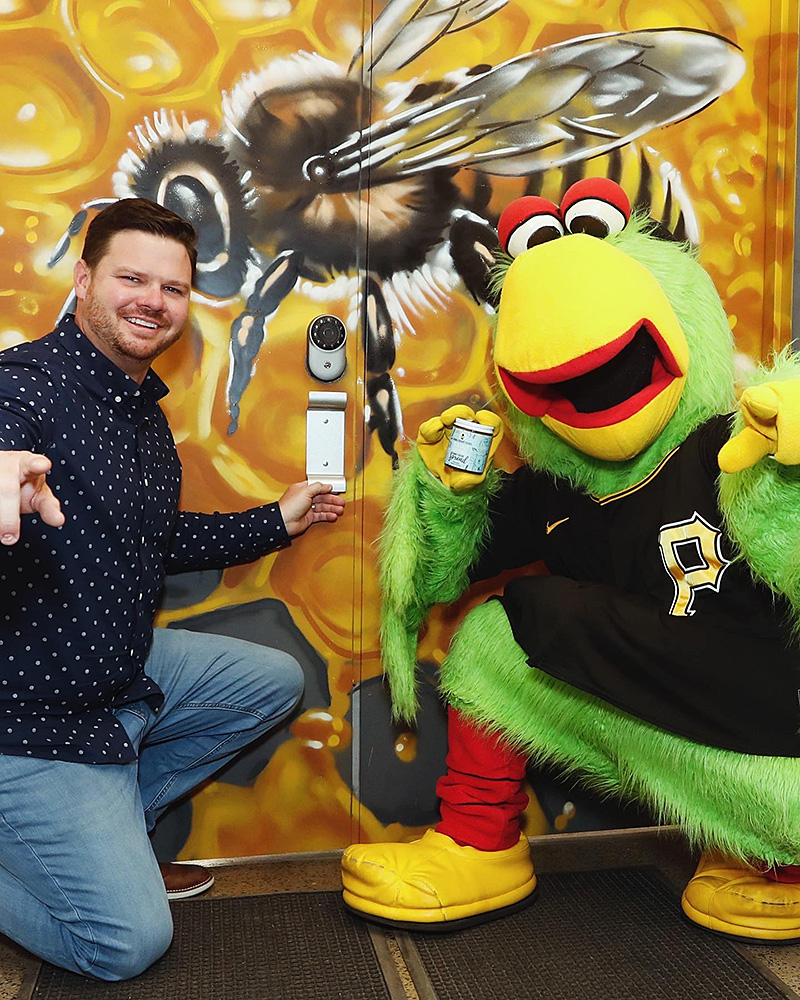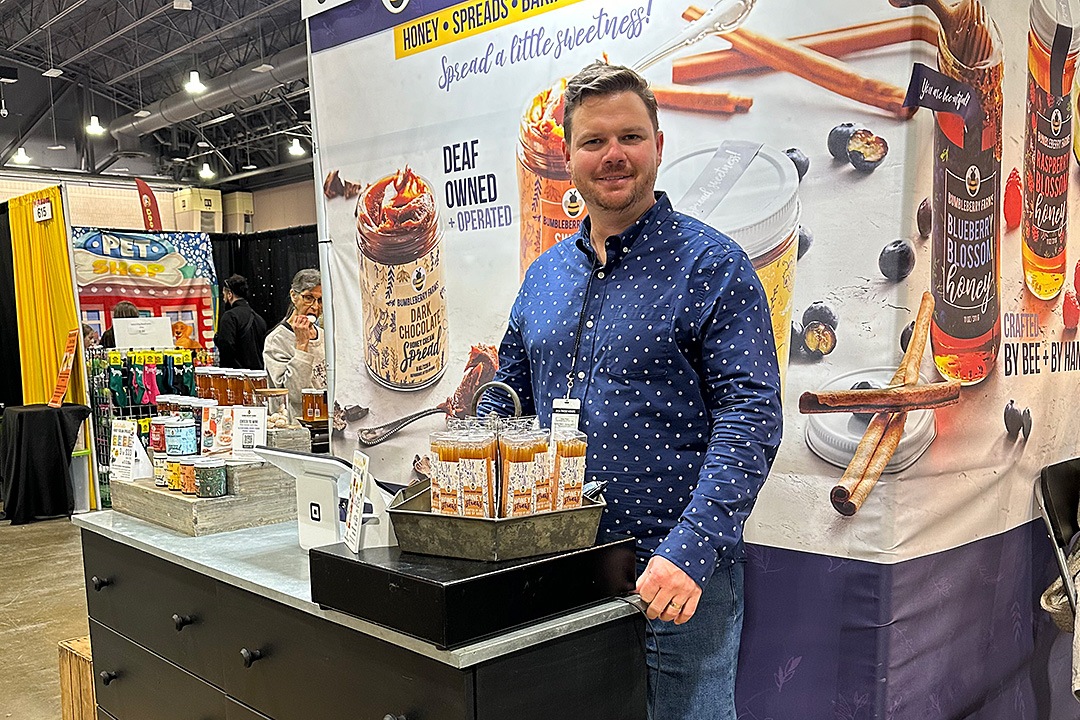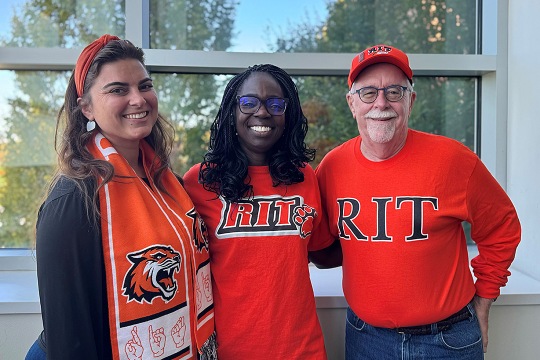RIT/NTID alum Jon Mosholder ’09 (business) has a strong entrepreneurial spirit, putting his business degree to work running Bumbleberry Farms, which was founded by his mother, Karen, in 2011.
Starting in her home kitchen, Karen created award-winning honey cream spreads, which led her to open a retail store and warehouse in Somerset, a small rural town located an hour southeast of Pittsburgh in the Laurel Highlands. When Karen planned to retire and sell the business, Mosholder expressed his interest in taking over the business and continuing her legacy.
Mosholder graduated from RIT/NTID with a degree in business management and gained valuable experience from his previous jobs as an accounting analyst for Bank of New York Mellon and an account manager for Purple VRS. These roles taught him how to manage customers and sell products, which prepared him for his current position as the owner of Bumbleberry Farms.
Why did you move Bumbleberry Farms to Pittsburgh?
 I relocated my business to Pittsburgh for several reasons. One of them was to be closer to the Deaf community and have better networking opportunities. By relocating to Pittsburgh, I am able to support the Deaf community by hiring deaf and hard-of-hearing employees and take advantage of the opportunities available in a larger city. The current location is different from the original one because it does not have a retail space. Currently the business is entirely online based, but in the future, I hope to bring the retail aspect back.
I relocated my business to Pittsburgh for several reasons. One of them was to be closer to the Deaf community and have better networking opportunities. By relocating to Pittsburgh, I am able to support the Deaf community by hiring deaf and hard-of-hearing employees and take advantage of the opportunities available in a larger city. The current location is different from the original one because it does not have a retail space. Currently the business is entirely online based, but in the future, I hope to bring the retail aspect back.
Please tell us about your job. What are your responsibilities? What’s a typical work day like?
I have an array of responsibilities to manage, ranging from employee hiring, onboarding, training, ordering supplies and managing inventory, accounting, and communicating with various organizations. For instance, I work closely with an accounting agency on financial matters; Dozanu, a deaf and women-owned business for anything related to marketing and social media; and a graphic designer on designing banners and other related materials.
I usually print orders the night before so the team can sort and organize products for two packing systems: wholesale and small orders for direct customers. Every day, orders are different, so I must always be on top of them. At the same time, I plan time for responding to customers, vendors and retailers. Building relationships and working on different new product ideas is a key to success to the company.
I also plan all our exhibits for shows and events. For example, Bumbleberry Farms attends the Philadelphia Flower Show each spring, which attracts about 250,000 attendees. We usually hire local university students to work at the booth. My responsibility is communicating with them, scheduling, and preparing the goods to be shipped to the show so we can be ready for the show. Additionally, we also exhibit at the Summer Fancy Food in New York City, where several companies, retailers and their key buyers attend to look for new products. Exhibiting at these types of events is a key strategy for achieving Bumbleberry Farms’ sales and growth objectives.
What are some challenges you face? What accomplishments are you most proud of?
Currently, my main challenge is to expand the range of products offered by Bumbleberry. As a business owner, I am constantly learning. However, I am blessed to have my mom as my mentor, as I can always ask her for advice when needed.
 On the other hand, we are proud to announce that our small business has been selected as one of six to be showcased during the Pittsburgh Pirates baseball season. Our business will be featured throughout the month of June at the Pirates games, in commercials, and on radio broadcasts.
On the other hand, we are proud to announce that our small business has been selected as one of six to be showcased during the Pittsburgh Pirates baseball season. Our business will be featured throughout the month of June at the Pirates games, in commercials, and on radio broadcasts.
How did your time at RIT help you prepare to operate the business?
My classes were very helpful in preparing me for my current role. I majored in management, minored in marketing, and concentrated in advertising and public relations. I made sure to absorb as much information as I could during my time at school.
I found the resources at RIT/NTID particularly helpful, especially their tutoring services, interpreters, and notetaking. The co-op services also helped me secure an internship at Bank of New York Mellon, which eventually became a full-time accounting analyst job. I stayed with them for six years. In addition, I had the opportunity to study abroad in Denmark for five weeks as part of one of my co-op experiences. I encourage students to take advantage of any opportunities that come their way, as all of my experiences and resources at RIT/NTID helped prepare me for success.
What advice do you have for RIT/NTID students who want to run their own business?
I encourage you to find your passion and not to give up. Take advantage of the resources available at RIT/NTID, such as the Simone Center for Innovation and Entrepreneurship, if you're passionate about setting up a business. This is a perfect opportunity to network with other people through the program. If you're curious, always ask questions, and remember that it's okay to make mistakes as you learn from them. Building relationships with professors and advisors is also important because they have much knowledge to benefit you.
Is there anything else you’d like to add?
Bumbleberry Farms is housed in a warehouse with approximately 30 other start-up businesses. It's a great setup because it allows for networking opportunities and the businesses can rely on each other for information and support. Supporting other businesses is important!







